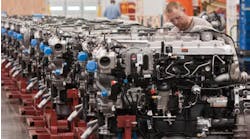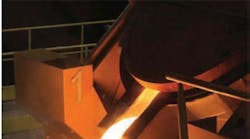June 9, 2006 -- One of the projects selected last year to receive a National Science Foundation grant is a study by Penn State University, the Massachusetts Institute of Technology, Furness-Newburge Inc., Versailles, KY, and Neenah Foundry Co., Neenah, WI, researching technological improvements in metalcasting processes, and modeling how these affect materials flow, economics, the environment, and social factors.
According to a Furness-Newburge, one aspect of the research focuses on energy savings created when molten metal is acoustically stimulated. Also under study is the use of advanced oxidation techniques to prevent pollution at metalcasting facilities. Furness-Newburge is a R&D organization specializing in industrial water-treatment and process optimization, and a manufacturer of ultrasonic and ozone generation equipment and electro-hydraulic cavitation devices.
The research aims to develop process enhancements to help metalcasters save money, become more globally competitive, and “to enhance the workers’ and neighbors’ environments.”
The NSF presented 17 grants last October aimed at gaining better understanding of “the interrelationships among living things -- from their genes to the ecosystems they inhabit and how they interact with their environment.” Ten of these awards were directed from the NSF’s Biocomplexity in the Environment (BE) program, which studies of the dynamics of coupled natural and human systems. These total over $10 million in support money.
The other seven grants, totaling nearly $7 million and including the metalcasting research project, are tied to the Materials Use: Science, Engineering, and Society (MUSES) project.



